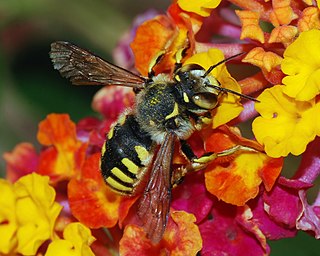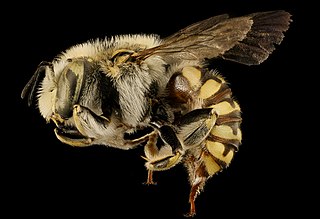
Anthidium is a genus of bees often called carder or potter bees, who use conifer resin, plant hairs, mud, or a mix of them to build nests. They are in the family Megachilidae which is cosmopolitan in distribution and made up of species that are mostly solitary bees with pollen-carrying scopa that are only located on the ventral surface of the abdomen. Other bee families have the pollen-carrying structures on the hind legs. Typically species of Anthidium feed their brood on pollen and nectar from plants. Anthidium florentinum bees are distinguished from most of its relatives by yellow or brick-red thoracic bands. They fly all summer and make the nests in holes in the ground, walls or trees, with hairs plucked from plants.
Anthidium utahense is a species of bee in the family Megachilidae, the leaf-cutter, carder, or mason bees.
Anthidium severini is a species of bee in the family Megachilidae, the leaf-cutter, carder, or mason bees.
Anthidium septemspinosum is a species of bee in the family Megachilidae, the leaf-cutter, carder, or mason bees.
Anthidium rubripes is a species of bee in the family Megachilidae, the leaf-cutter, carder, or mason bees.

Anthidium porterae is a species of bee in the family Megachilidae, the leaf-cutter, carder, or mason bees. This bee was named in honour of Wilmatte Porter Cockerell.
Anthidium placitum is a species of bee in the family Megachilidae, the leaf-cutter, carder, or mason bees.
Anthidium mormonum is a species of bee in the family Megachilidae, the leaf-cutter, carder, or mason bees.

Anthidium maculifrons is a species of bee in the family Megachilidae, the leaf-cutter, carder, or mason bees.
Anthidium latum is a species of bee in the family Megachilidae, the leaf-cutter, carder, or mason bees.
Anthidium gayi is a species of bee in the family Megachilidae, the leaf-cutter, carder, or mason bees.
Anthidium garleppi is a species of bee in the family Megachilidae, the leaf-cutter, carder, or mason bees.
Anthidium funereum is a species of bee in the family Megachilidae, the leaf-cutter, carder, or mason bees.
Anthidium emarginatum is a species of bee in the family Megachilidae, the leaf-cutter, carder, or mason bees.
Anthidium cordiforme is a species of bee in the family Megachilidae, the leaf-cutter, carder, or mason bees.
Anthidium collectum is a species of bee in the family Megachilidae, the leaf-cutter, carder, or mason bees.
Anthidium atricaudum is a species of bee in the family Megachilidae, the leaf-cutter, carder, or mason bees.
Anthidium albitarse is a species of bee in the family Megachilidae, the leaf-cutter, carder, or mason bees.
Anthidium afghanistanicum is a species of bee in the family Megachilidae, the leaf-cutter, carder, or mason bees.
Anthidium abjunctum is a species of bee in the family Megachilidae, the leaf-cutter, carder, or mason bees.


